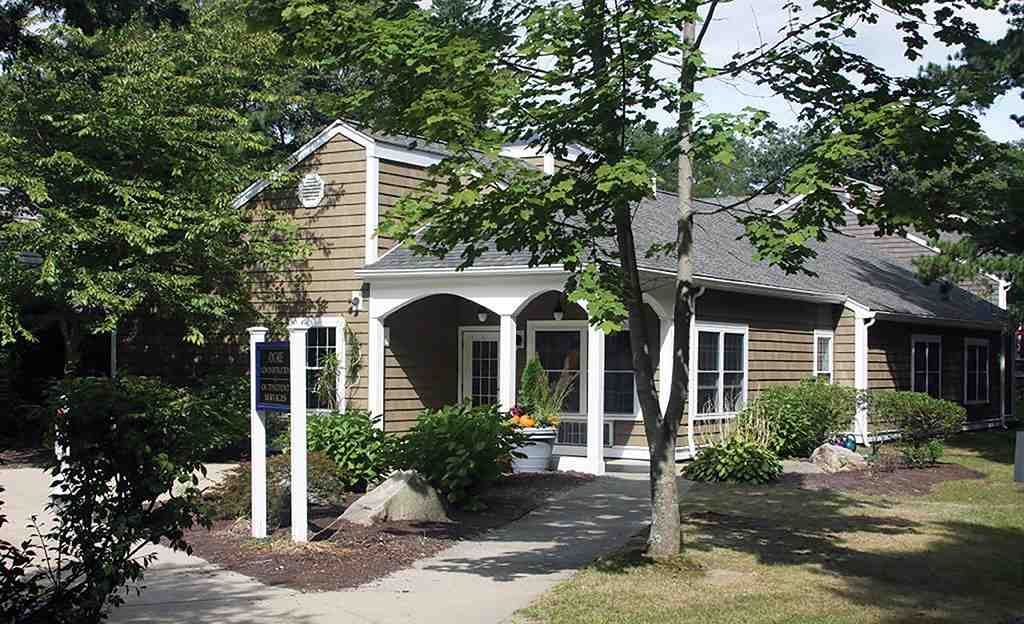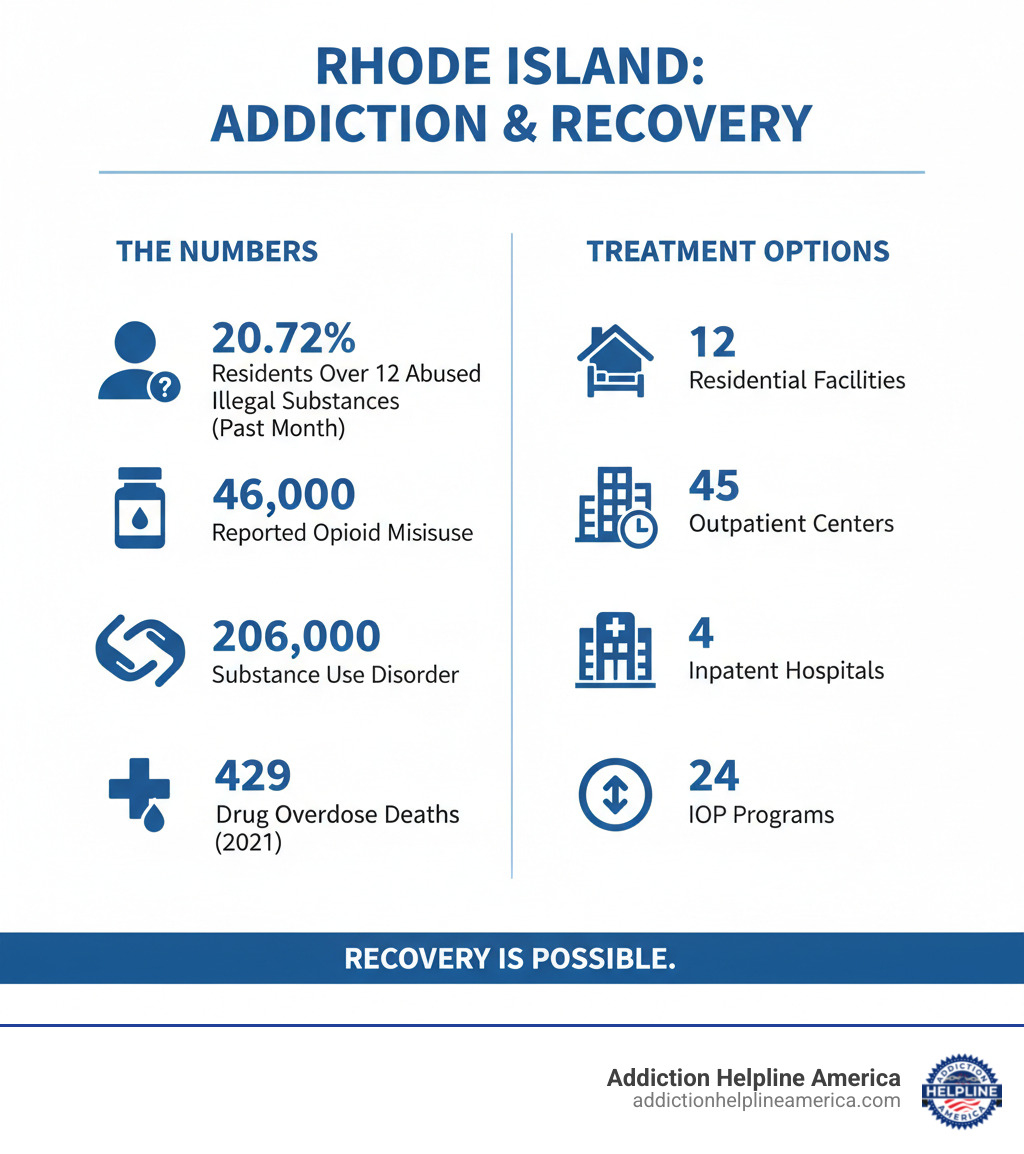
Why Choosing the Right Rhode Island Drug Rehab Is Crucial
Drug rehab Rhode Island facilities offer comprehensive treatment options to help individuals overcome addiction, with 56+ treatment centers providing services from medical detox and inpatient residential care to intensive outpatient programs (IOP) and standard outpatient treatment. Here’s what you need to know right now:
Quick Overview: Drug Rehab Options in Rhode Island
- Inpatient/Residential Treatment: 24/7 care in a structured setting, typically lasting 28-90 days
- Outpatient Programs: Flexible treatment while living at home, including IOP (12-20 hours/week) and standard outpatient (1-2 hours/week)
- Medical Detox: Supervised withdrawal management lasting 5-7 days
- Centers of Excellence: State-supported facilities offering expedited access to opioid use disorder treatment
- Crisis Support: 988 Suicide & Crisis Lifeline, BH Link Walk-In Center (24/7), and Safe Stations for immediate help
The numbers tell a sobering story. Drug overdoses are the leading cause of accidental death in Rhode Island—happening more often than car accidents, fires, and firearms combined. In 2022 alone, every single town in the Ocean State recorded at least one fatal overdose. For families watching a loved one struggle, these statistics aren’t just numbers. They’re neighbors, friends, and family members.
But here’s what the statistics don’t show: recovery is absolutely possible. Thousands of Rhode Islanders have found their way back to health through the state’s network of treatment centers, support services, and evidence-based programs. The challenge isn’t whether help exists—it’s knowing where to look and how to steer your options.
At Addiction Helpline America, we’ve guided countless individuals and families through the often-overwhelming process of finding effective Drug rehab Rhode Island treatment that matches their specific needs and circumstances. We understand that taking this first step requires both courage and clear, actionable information—which is exactly what the seven strategies ahead will provide.
Relevant articles related to Drug rehab Rhode Island:
- how to find a good rehab center
- Drug treatment options
- how to find rehab programs that accept insurance
Way 1 & 2: Understand Treatment Levels and Leverage State Resources
Navigating addiction treatment shouldn’t feel like decoding a medical textbook. Think of it instead as understanding the different lanes on a highway—each one gets you where you need to go, but at different speeds and with different levels of support. The key is finding the right fit for your situation.
Rhode Island offers something many states don’t: a genuinely comprehensive system of care that meets people wherever they are in their recovery journey. Whether someone needs round-the-clock medical supervision or flexible treatment that allows them to keep working, there’s a path forward. And here’s the good news—the state has built an entire infrastructure to help you find licensed, qualified providers without getting lost in bureaucracy.
Understanding these options isn’t just smart—it’s empowering. When you know what’s available and how to access Rhode Island’s official support systems, you’re already taking control of your recovery story.
| Feature | Inpatient/Residential Rehab | Outpatient Rehab in Rhode Island |
|---|---|---|
| Living Situation | You live at the treatment facility 24/7 during your program | You live at home and travel to the facility for scheduled treatment sessions |
| Level of Care | Most intensive option with constant medical and therapeutic support | Varies from intensive (IOP: 9-20 hours/week) to standard outpatient (1-2 hours/week) |
| Best For | Severe addiction, co-occurring disorders, unstable home environments, those needing medical detox | Stable living situation, strong support system, mild to moderate addiction, step-down care after inpatient |
| Typical Duration | 28-90 days (some long-term programs extend 6-12 months) | Several months to over a year, depending on progress and program type |
| Cost | Higher due to 24/7 care, room, board, and medical supervision | Generally more affordable; allows you to maintain employment |
| Daily Structure | Highly structured schedule including therapy, groups, meals, activities, and downtime | Flexible schedule that fits around work, school, or family responsibilities |
Decoding Levels of Care: From Inpatient to Outpatient
Here’s where treatment gets personal. The “continuum of care” isn’t just jargon—it’s the recognition that recovery isn’t one-size-fits-all. Your journey might start with intensive inpatient care and gradually step down to less intensive options as you build strength and skills. Or you might begin with outpatient treatment if your situation is stable.
Inpatient or residential treatment provides the highest level of structure and support. You live at the facility, usually for 28 to 90 days, receiving therapy, medical care, and 24/7 supervision in a safe environment. This option makes sense when someone needs to completely step away from their daily environment to focus entirely on healing. Many Drug rehab Rhode Island programs start here, especially when medical detox is necessary—that critical 5-7 day period where medical professionals help you safely withdraw from substances.
Partial Hospitalization Programs (PHP), sometimes called day treatment, offer nearly the same intensity as inpatient care but allow you to return home each evening. You’ll typically spend 5-6 hours per day at the facility, receiving therapy and medical monitoring. This works beautifully for people who have a stable, supportive home environment but still need substantial daily structure.
Intensive Outpatient Programs (IOP) strike a middle ground. You’ll attend treatment sessions for 9-20 hours per week—usually several evenings or a few full days—while maintaining your job, caring for family, or attending school. IOP is often the next step after completing inpatient treatment, or it can be the starting point for someone with a strong support system at home.
Standard outpatient programs offer the most flexibility, with sessions typically occurring once or twice weekly for an hour or two. This level works best for people with mild to moderate addiction, those transitioning from more intensive care, or individuals who have completed treatment and need ongoing support to maintain their recovery. You can learn more about the full range of Rhode Island rehabs and what each facility offers.
The beauty of this continuum is that you’re not locked into one level forever. As you progress and build coping skills, you can step down to less intensive care. And if you hit a rough patch? You can always step back up to more support. Recovery isn’t a straight line, and Rhode Island’s treatment system understands that.
Tapping into Rhode Island’s Official Support Systems
Rhode Island doesn’t just have treatment centers—it has an entire ecosystem designed to help you find the right one. The state has invested heavily in making quality addiction treatment accessible, and knowing how to tap into these official channels can save you countless hours of research and frustration.
The Rhode Island Department of Health (RIDOH) serves as a central hub for addiction resources and data. They track overdose trends, publish treatment guidelines, and maintain up-to-date information on prevention and recovery services. Their website offers a wealth of information about the state’s response to the opioid crisis and where to find help.
But the real powerhouse for finding treatment is BHDDH—the Department of Behavioral Healthcare, Developmental Disabilities and Hospitals. Yes, it’s a mouthful, but this crucial state agency oversees the licensing and certification for all addiction treatment providers throughout Rhode Island. Their website is a primary resource for consumers. When you choose a BHDDH-licensed provider, you can be confident that you’re getting care that meets stringent state standards for quality, ethics, and safety.
BHDDH also operates something truly innovative: Centers of Excellence (COEs). These specialized facilities provide expedited access to medication-assisted treatment for opioid use disorder, often getting people into care the same day they reach out. The COEs focus specifically on buprenorphine and other evidence-based medications that dramatically improve recovery outcomes. This matters because when someone is ready for help, waiting weeks for an appointment can be the difference between recovery and relapse.
The state also maintains several data hubs that track real-time information about opioid and alcohol use across Rhode Island. While these are primarily for public health monitoring, they’ve helped shape where resources get allocated—meaning treatment centers tend to be located where they’re needed most.
If you’re specifically looking for options in the state’s largest city, you’ll find a concentrated network of resources through Providence rehabs. The capital city offers everything from hospital-based programs to community centers, all working within this same state-supported framework.
The bottom line? You don’t have to figure this out alone. Rhode Island has built the infrastructure—the licensed providers, the oversight systems, the Centers of Excellence—to guide you toward quality Drug rehab Rhode Island treatment. The state wants you to succeed, and they’ve put the tools in place to help make that happen.
Our helpline is 100%
free & confidential
If you or someone you care about is struggling with drug or alcohol addiction, we can help you explore your recovery options. Don’t face this challenge alone—seek support from us.
Programs
Resources
Will my insurance
cover addiction
treatment?
We're ready to help
Find the best
drug or alcohol treatment
center
Are you or a loved one struggling with addiction? Call today to speak to a treatment expert.














